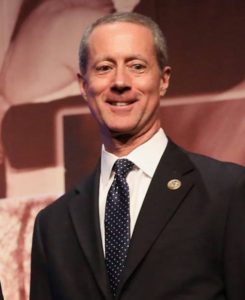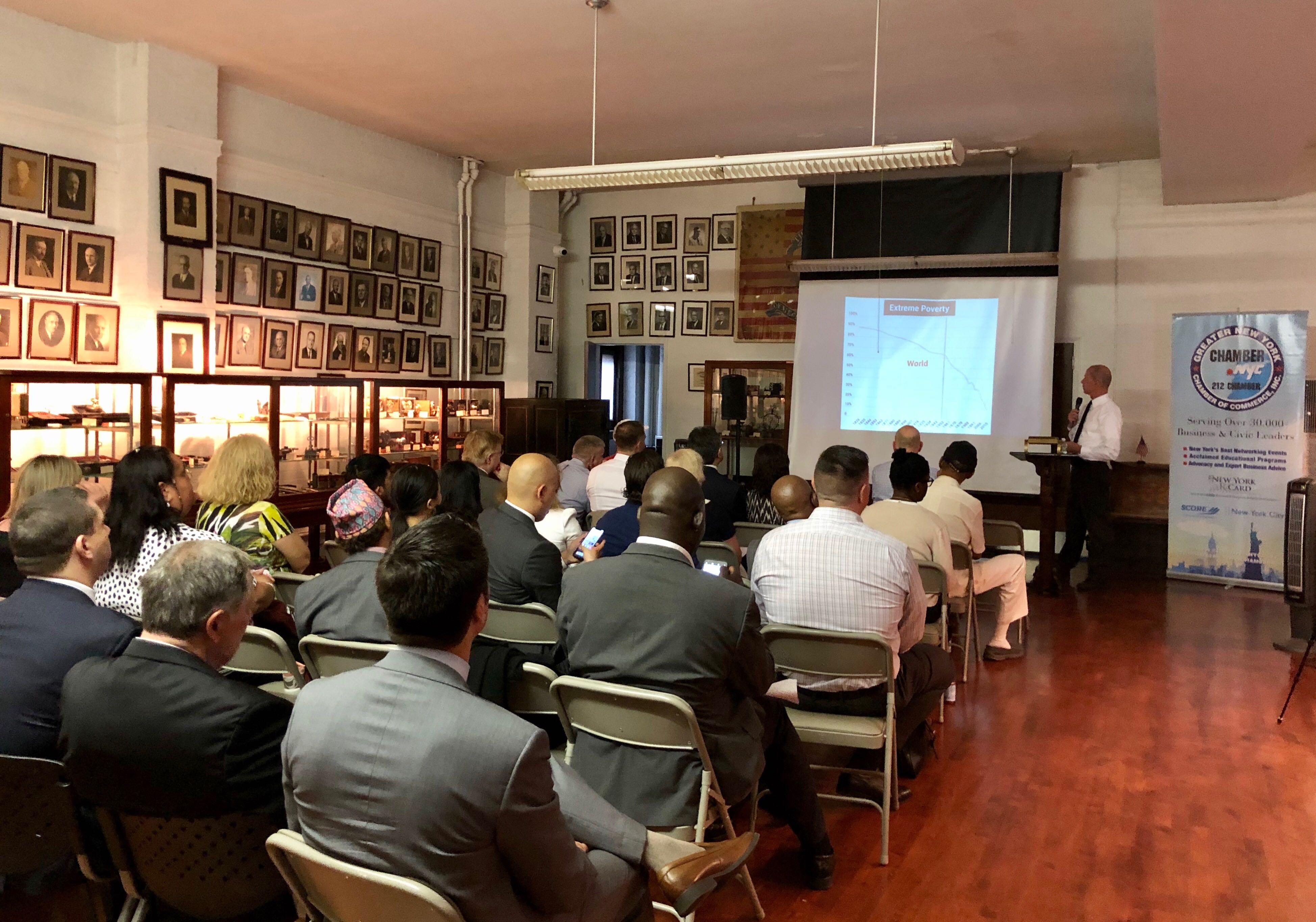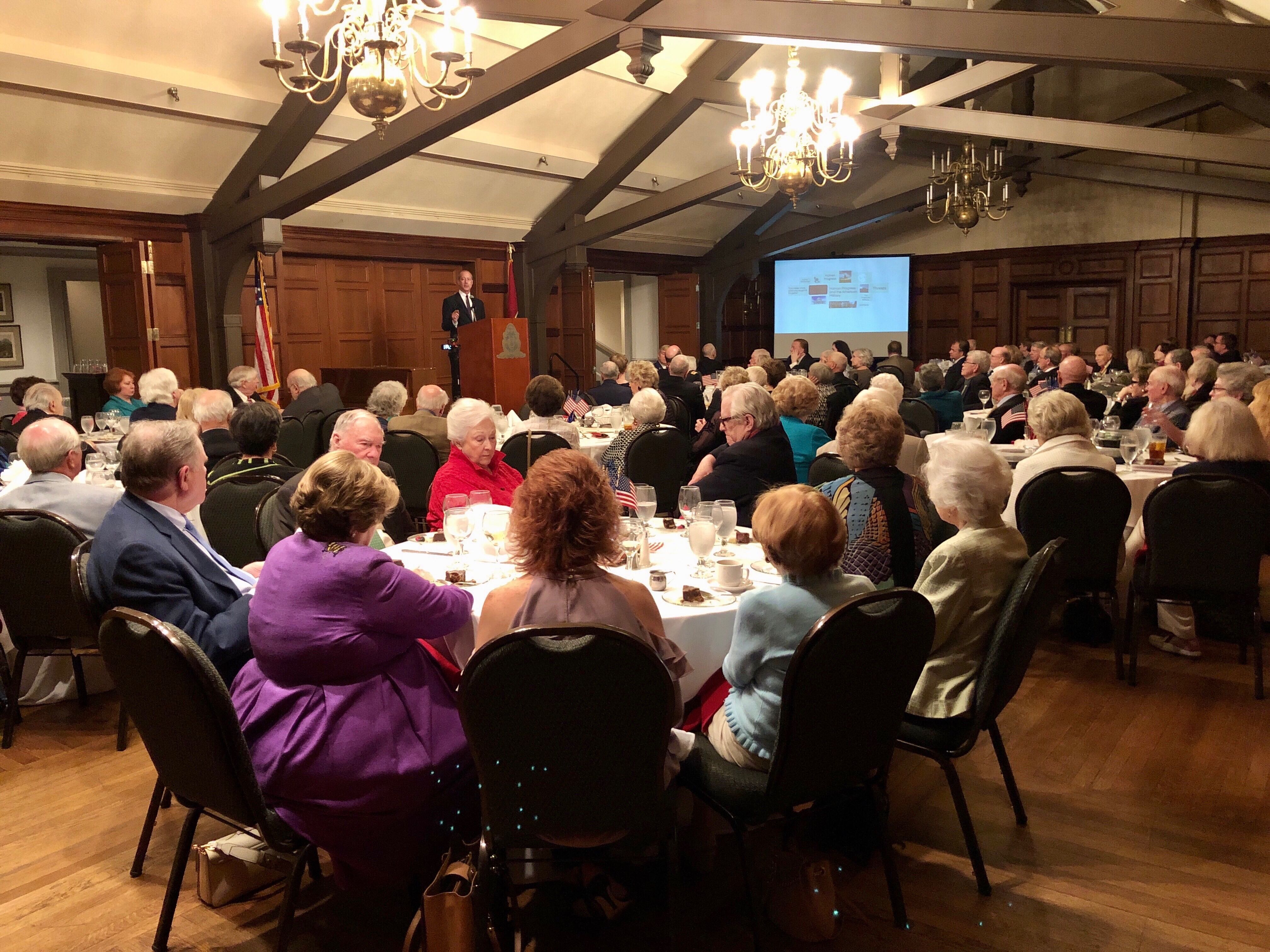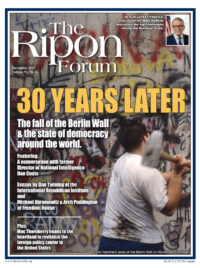
Forty-five years ago, Secretary of State Henry Kissinger engaged in an unusual form of shuttle diplomacy. He did not jet between Middle Eastern capitals and conciliate among heads of state on matters of war and peace. Instead, he flew to cities in the American interior and lectured dozens of times to ordinary civic groups about the moral foundations and practical purposes of U.S. foreign policy.
Kissinger delivered what became known as the “Heartland Speeches” from 1974 through 1976 to foster support for his policy of détente with the Soviet Union and fortify America’s resolve as an international leader after a decade of domestic disunity, a lost war, and a presidential resignation.[1] Given such traumas, Americans found themselves “doubtful of our virtue and uncertain of our direction,” Kissinger said in Minneapolis in July 1975. “Amid frustration, many Americans questioned the validity of our involvement in the international arena; in the wake of our disappointments, some abroad now doubt our resolve.”[2] Americans were asking: “The world may need us, but do we need the world?”[3]
Kissinger’s response was a resounding “Yes.” “[B]itter experience” showed that America’s safety and affluence were “inextricably linked” to world peace and prosperity, he told a Detroit audience in November 1975.[4]
Kissinger’s addresses returned repeatedly to this and other key themes. First, the United States had been indispensable in designing and maintaining a global, rules-based system.[5] The United States “undertook these efforts not as charity, but in our enlightened self-interest,” he said in St. Louis in May 1975, because its “international effort saved American lives and preserved American jobs.”[6] Second, unity domestically and with allies was fundamental to success.[7] Third, the United States could not thrive if “isolated…from the international economy.”[8] And fourth—perhaps surprising to Kissinger’s critics—U.S. policy should further moral purposes “in a world where power remains the ultimate arbiter,”[9] because foreign policy “without moral purpose is like a ship without a rudder, drifting aimlessly from crisis to crisis.”[10]
The short-term success of the Heartland Speeches is difficult to measure, but the United States remained the guardian of the rules-based, rights-oriented system for decades.

But in just the past three years, we have witnessed the most sustained challenge to American global leadership in generations. And it has arisen not only from rivals without but from skeptics within. Some have become “doubtful of our virtue,” as Kissinger said, believing America is too flawed and fallen to meliorate a vexed world. Others—President Donald Trump first among them—have “questioned the validity of our involvement in the international arena,” to quote Kissinger, seeing America’s overseas commitments not as valuable investments in a safer, richer, and more democratic world that redounds to its benefit, but a money pit for ungrateful free-riders. Because of this frustration, the United States has begun to discard its responsibilities to maintain the world order it has built, even though that system has not failed but succeeded to an extent “without precedent in human history,” as Kissinger said.[11] We see this turn in the forsaking of multilateral agreements like the Trans-Pacific Partnership (TPP), needless trade wars with allies, and the desertion of the Syrian Kurds, among others.
In just the past three years, we have witnessed the most sustained challenge to American global leadership in generations. And it has arisen not only from rivals without but from skeptics within.
In the last year of his life, Sen. John McCain spoke out against this brewing quasi-isolationism. Twice in speeches in October 2017, McCain argued that the United States has a “moral obligation” to champion abroad its ideals and the security of itself and its friends.[12] He lamented how many Americans “seek escape from the world we’ve led so successfully” and are “asleep to the necessity of our leadership and to the opportunities and real dangers of this world.”[13]
I wrote then that, whether he knew it or not, McCain was echoing Kissinger’s Heartland Speeches and that McCain’s efforts, promoting what I called an “ecumenical internationalism” to Americans beyond the Beltway, should be embraced and emulated by others.[14]
I was pleased to learn recently of an under-the-radar effort over the past year by Texas Congressman Mac Thornberry, the ranking member of the House Armed Services Committee, to bring such a message to communities outside the Acela corridor. It is an important effort that deserves recognition and the flattery of imitation.
Before chambers of commerce and civic groups in cities from Aspen to Memphis, and Huntsville to Houston, among others, Thornberry has made the argument that the quality of life of most Americans is better than it was for their parents and grandparents, thanks in no small measure to the American-led, seven-decades-old international system that regular citizens have the opportunity and obligation to fortify.
Before chambers of commerce and civic groups in cities from Aspen to Memphis, Thornberry has made the argument that the quality of life of most Americans is better thanks in no small measure to the American-led, seven-decades-old international system.
He begins his speech with charts showing how life expectancy, GDP per capita, and democratic governance have exploded since the end of World War II. Lines that represent the level of extreme poverty and global deaths from conflict drop like ski slopes.
“The progress of the last 70 years was not inevitable,” Thornberry says.[15] What changed was that the United States made two key decisions after the Second World War. First, it decided to stay consistently engaged in global affairs through institutions like the World Bank, the Marshall Plan, and the United Nations. Second, it invested in a strong military and national security establishment to undergird these institutions, support friends, and deter foes. This strategy, Thornberry argues, was historically unique and reflected a bipartisan consensus that persisted despite mistakes.
Foreign rivals have, unsurprisingly, sought to undermine this system, Thornberry says. But what has been surprising is that America’s central commitments “to be strong and to stay engaged are being challenged here at home in both parties.”
Thornberry warns that if the U.S. withdraws from global leadership, others will fill the void, particularly China, which is no friend of liberty. “If China sets the rules, more nations will follow,” he says. “As we saw in the 1930s, the infection of authoritarianism tends to spread, and we should never think we are immune even here at home.”
To ensure that American values and interests continue to predominate, Thornberry argues the country must reaffirm its fundamental commitments to the international system. He says Americans can help by taking three steps.
First, they can be wary of what they read and share on social media. He makes a deft point that aerial bombing was once used to damage an adversary’s economy and undermine civilian morale; disinformation on social media is having the same effect without the kinetics. Second, he encourages his audiences to remind others of America’s accomplishments and how precarious they are. And third, he encourages his listeners to press their representatives to favor policies that preserve international structures and U.S. strength.

Thornberry, who read Kissinger’s Heartland Speeches before giving his own, told me in an interview that his goal has been to “plant a seed” with community leaders, to remind them that “what happens over there matters in a dollars and cents, economic well-being way.” While Americans will disagree over specific policies, he targets the “broad middle of American thought” and hopes to “advocate for a mindset that we can’t roll up our tent” internationally; we need to remain engaged in organizations and agreements, including the TPP. At bottom, if America steps back, others will step forward, he says, and “the world will become darker and more dangerous.”
To ensure that American values and interests continue to predominate, Thornberry argues the country must reaffirm its fundamental commitments to the international system.
Thornberry’s addresses—clear, factually-grounded, and serious—are a welcome respite from the often bilious, glib, and fact-free exudations that constitute contemporary political communication. Other leaders, whether elected politicians, veterans, or engaged citizens, would do well to follow his example.
When so little seems to unite Americans, all can take pride in what McCain called “the better world” that their country helped build decades ago. A shared commitment to global leadership may even help renew Americans’ frayed bonds. Thornberry and others should consider giving further addresses with members of both parties to show as much. And while criticism of past (even grievous) misadventures—by Kissinger and many others—are warranted, all can recognize that the United States does not have to be perfect to be a force for good.
Thornberry’s speeches are laced, as Kissinger’s were, with a tragic sensibility. “History tells us that civilization can and has gone backwards,” Thornberry says, lamenting that many Americans may be oblivious to “what man is capable of doing to fellow man.” But he is also hopeful that individuals have the ability to make the nation a force for good.
Kissinger would recognize that, too. “This country’s foreign policy is not a burden; it is a success and a promise,” he said in Detroit in November 1975, “We have done great things. There are great things yet to do.”[16] Accomplishing them will take a renewed faith—embraced with neither cynicism nor sentimentality—that peace, prosperity, and human dignity can best advance under American stewardship, if the country is willing to lead the way.
An attorney and former intelligence officer, Matthew F. Ferraro is a term member of the Council on Foreign Relations and a Visiting Fellow at the National Security Institute at George Mason Law School.
_____________________________
[1] Henry Kissinger, “America’s Destiny: The Global Context,” The Department of State Bulletin, 74, no. 1914 (Mar. 1, 1976): 249 (address at the University of Wyoming, Laramie, Wyo. on Feb. 4). Kissinger’s speeches are hereinafter short-cited as “Kissinger, [city of address], [page number].”
[2] Henry Kissinger, “The Moral Foundations of Foreign Policy,” The Department of State Bulletin, 73, no. 1884 (Aug. 4, 1975): 161 (address before the Upper Midwest Council and other organizations at Bloomington (Minneapolis), Minn. on July 15).
[3] Henry Kissinger, “American Unity and the National Interest,” The Department of State Bulletin, 73, no. 1890 (Sept. 15, 1975): 389 (address before the Southern Commodity Producers Conference at Birmingham, Ala. on Aug. 14).
[4] Henry Kissinger, “Building an Enduring Foreign Policy,” The Department of State Bulletin, 73, no. 1903 (Dec. 15, 1975): 841 (address before a dinner meeting sponsored by the Economic Club of Detroit and other local organizations in Detroit, Mich. on Nov. 24).
[5] Kissinger, Laramie, 249-250.
[6] Henry Kissinger, “The Challenge of Peace,” The Department of State Bulletin, 72, no. 1875 (June 2, 1975): 706 (address before the St. Louis World Affairs Council at St. Louis, Mo. on May 12).
[7] Kissinger, Detroit, 843.
[8] Henry Kissinger, “Strengthening the World Economic Structure,” The Department of State Bulletin, 72, no. 1875 (June 2, 1975): 713 (address before the Kansas City International Relations Council at Kansas City, Mo. on May 13).
[9] Kissinger, Minneapolis, 161.
[10] Henry Kissinger, “Moral Promise and Practical Needs,” The Department of State Bulletin, 75, no. 1951 (Nov. 15, 1976): 598 (address before the Synagogue Council of America at New York, N.Y. on Oct. 19).
[11] Kissinger, Minneapolis, 161.
[12] John McCain, “Remarks by Senator John McCain at 2017 Liberty Medal Ceremony,” Oct. 16, 2017, https://battleinvestmentgroup.com/senator-john-mccains-remarks-2017-liberty-medal-ceremony/.
[13] John McCain, “McCain Remarks to Brigade of Midshipmen at U.S. Naval Academy,” Oct. 30, 2017, https://bobdavisblog.wordpress.com/2017/11/05/mccain-remarks-to-brigade-of-midshipmen-at-u-s-naval-academy/.
[14] Matthew F. Ferraro, Speak to the Heartland: Lessons from Kissinger’s Defense of Détente, Real Clear Defense, Jan. 3, 2018, https://www.realcleardefense.com/articles/2018/01/03/speak_to_the_heartland_lessons_from_kissingers_defense_of_dtente_112847.html.
[15] I draw these quotes from Rep. Thornberry’s prepared text, his slide deck, and the video of a speech he gave in Denver, all provided by his office.
[16] Kissinger, Detroit, 850.




